In the 54 years that have passed since its first episode, Doctor Who has featured almost as many companions. For all the characters who come and go, the role of companion is what makes the show work. The Doctor’s companion is the audience’s surrogate; they become the eyes through which we see alien worlds and ancient times. And now, in the show’s tenth (or thirty sixth, if you want to count all the way back) series, the eyes are those of a queer woman. When Bill Potts told the Doctor about giving extra chips to the girl she had a crush on in the series’ opening few minutes, she became the most prominent character in a long, often overlooked history of LGBTQ representation in the Doctor Who universe.
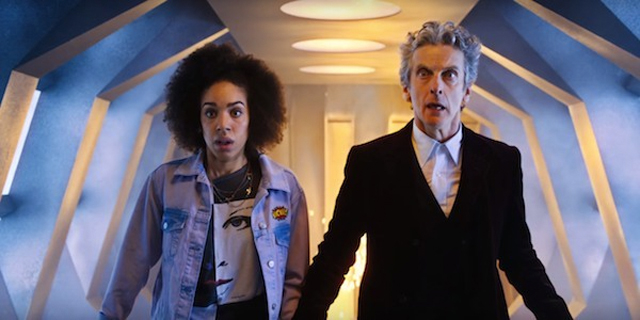
Between Doctor Who itself, its televised spin-offs Torchwood and Class (with The Sarah Jane Adventures having intended to introduce a boyfriend for its male lead, had the show not been sadly cut short by the death of Elisabeth Sladen), and the Expanded Universe, the series has remained quietly committed to including queer characters in its ever-changing cast. They’ve ranged from series leads to cameos, lizard women to FBI agents. And, over the past decade, they’ve meant the world to me.
I was 11 when Doctor Who was brought back, and it instantly became my entire world. Doctor Who is so firmly sewn into the fabric of the U.K. that even with the show having been off air since before I was born, I knew all about it – we’d all grown up with the jokes about Daleks and running down corridors and planets that look like quarries. But this new Doctor Who wasn’t anything like the hokey old show people laughed about. I was hooked from the very first shot, when the camera zooms in from space to a south London council estate. It was like nothing I’d seen before.

Two episodes in, a character mentioned her boyhood on Earth. I didn’t think that much of it – she was, after all, a piece of skin who just tried to blow up a spaceship. But three-quarters of the way through that first series, Captain Jack Harkness appeared. He was incredible. He swept Rose, the Doctor’s companion, off her feet and shone with the easy confidence I wished I had. In his first episode, Jack, Rose and the Doctor were trying to enter a restricted area:
JACK: Well, there it is! They’ve got Algy on duty here? Must be important.
DOCTOR: Well we’ve got to get past him.
ROSE: Are the words ‘Distract the guard’ heading in my general direction?
JACK: I don’t think that’d be such a good idea.
ROSE: Don’t worry; I can handle it.
JACK: I’ve got to know Algy quite well while I’ve been in town. Trust me, you’re not his type. I’ll distract him. Don’t wait up!
DOCTOR: Relax! He’s a fifty-first century guy. He’s just a bit more flexible when it comes to…dancing.
He’s the first queer character I’d ever seen.
I knew, hypothetically, that some people are gay. I knew, too, that it’s not a good thing to be. Gay is an insult. Gays can’t get married like everybody else. If you’re gay, you’re different, and playground politics had already taught me that was a bad thing to be. But now I also knew that in Doctor Who’s fifty-first century, that isn’t the case. Everyone can be ‘flexible’, and nobody minds. And I knew, with the absolute sincerity you can only really summon when you’re eleven years old, that I wanted to exist in that world.
I was 12 when Torchwood started. I really shouldn’t have been watching it. The two part premiere includes an alien that kills its victims through orgasm. It also includes the first kiss I ever see between two women.
Torchwood is a lot more explicitly queer than Doctor Who, but that queerness is hypersexualised and classed as adult content alongside the swearing and fucking and monsters that rip off your face. One half of that kiss was a straight woman being manipulated by the alien sex pheromones of the other half. It’s all aggressively visceral and kind of ridiculous and absolutely not meant for me. I was twelve, and sex frightened me.
My friends had started to talk about boys, and I hated it. The only boys I cared about were Jack Harkness and Ianto Jones. Captain Jack headed up Torchwood‘s cast, and while his sexuality had been literally danced around on Doctor Who, the transfer to an adults-only spin-off gave the writers free reign. By mid-series, he was sleeping with his support officer, Ianto Jones. Where Jack exploded in glorious, flamboyant queerness, Ianto was quiet and dry and had never been with a man before. On a show where almost everything is played for laughs or shocks, their relationship stood out in its real human awkwardness. I was completely besotted.
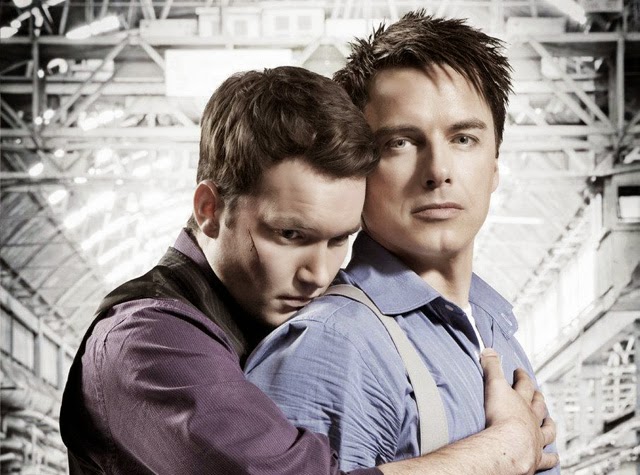
With Captain Jack’s departure to Torchwood, Doctor Who wouldn’t feature another explicitly queer recurring character for years. However, the show filled the planets and eras the Doctor visited with a queer supporting cast. It was scanty visibility at best, rarely more than a line or two, but it was all but unique in a family show at the time. The middle-aged men on the Doctor Who forums I checked for set photos complained about the show’s ‘gay agenda’, but I watched and rewatched each episode until even the most inconsequential queer character was seared into my memory. They’re still stuck there today: the Cassini ‘sisters’, travellers on the motorway in “Gridlock”; Sky Silvestri, on holiday in “Midnight” after splitting with her wife; Midshipman Frame, who the Doctor sets up with Captain Jack in his cameo in “The End of Time.”
Doctor Who filled the universe with queers, even as my real world remained as straight and stifling as ever.
I was 15 when Ianto Jones died in the arms of Captain Jack Harkness, and I was utterly heartbroken. I had been forewarned; there’d been a screw-up at some delivery warehouse and DVDs of the series had been sent out early. One lucky recipient had typed up a list of every plot detail and leaked it; now I got to watch the bullet-point ‘Ianto dies’ play out in agonising detail. A raid on the alien headquarters goes wrong, a lethal virus is released and Ianto dies. That’s it. Game over.
I cried as quietly as I could in the stockrooms at work the next day, mortified at how torn apart I was over the death of someone who never existed. To be honest, the Ianto I was mourning wasn’t really the TV character. Almost every night for the last three years, I’d snuck down to the family computer and read endless reams of Torchwood fanfiction while I should have been sleeping. I devoured any romance between Jack and Ianto I could find, from coffee shop AUs to crossovers with franchises I’d never even heard of. I followed the same beats of them falling in love over and over again in a hundred different scenarios, and every story had a happy ending.
I needed those happy endings. I was in the closet, deeply depressed and desperately lonely. I’d still never met anybody I knew to be queer, let alone queer and in the kind of happy relationship I saw straight couples in all the time. I was drowning in a sea of heteronormativity, and I had thrown my entire heart into the safe harbour of these gay love stories. Now it felt quite like someone had ripped out that heart and crushed it in their fist.
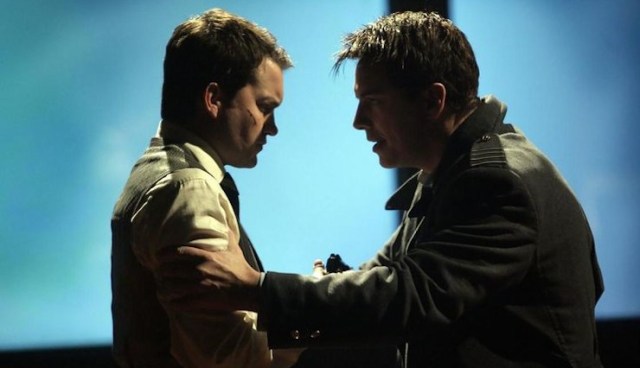
I wasn’t the only one. The community that had gathered around the relationship was in uproar; shock quickly turned to anger and then to action. A memorial was started. Letters were sent. I had never done anything but silently lurk on the sites I’d spent so many nights trawling through, but the energy was electrifying. I started writing. Comments at first, then blog posts, then my own fanfiction. I set out to rewrite the narrative we’d been given, to create my own happy endings.
Then all the letters actually got a reply. Russell T Davies, showrunner of both Torchwood and Doctor Who told those upset about Ianto’s death to “grow up”, “find something else” and “stop riding on a bandwagon that they actually don’t know anything about”. I couldn’t join in the rage the rest of my new community summoned in response; I was just embarrassed, as embarrassed as I had been sobbing between the winter coats at work. I quietly deleted everything I had written, abandoned my harbour and let myself be swallowed by the sea.
I would be 17 by the time Doctor Who introduced another gay pairing. Jenny and Madame Vastra were cool and queer and loved each other in a way I was desperate to be loved. Vastra was a lizard woman from the dawn of time, Jenny her wife and maid. Together, they solved crimes. In Victorian London. They were the best part of a series that seemed to be flailing beneath budget cuts and grumblings about its new showrunner; while the complaints grew louder, I hung on, waiting for every time Jenny and Vastra would show up. They kicked ass and made filthy cunnilingus jokes and, miraculously, neither of them died.
They kept appearing, and they kept surviving. By this point, I was well aware that Ianto’s death had been part of a long, and still growing, history of queer death on television. I was wary now; I held my breath through every episode they were in, waiting for one of them to die. Then, in “The Name of the Doctor”, it finally happened. I was 19, and I’d moved away to university, which meant squashing into my uni accommodation single bed when a friend wanted to watch the episode together. When Jenny was murdered, it wasn’t even a surprise. We were both queer women, and depressingly used to seeing ourselves murdered on screen. What was a surprise was that Jenny came back.
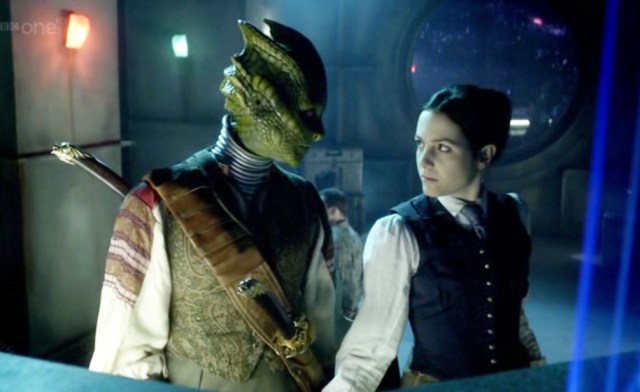
We cheered when she was revived, as loudly as if our side had won the championship. When the show’s 50th anniversary special rolled around six months later, we went on a date to the cinema screening. By the time Jenny and Madame Vastra next appeared on the show, we were living together.
I’m 23 now, and the Doctor Who universe is more queer than ever. Class‘s Charlie Smith can live with his boyfriend while River Song talks about her wives and Bill Potts flirts with every other girl she sees. It’s not perfect – hell, the very exchange in which Bill first outs herself ends in a horrible fatphobic joke – but with Bill as the Doctor’s companion, the representation of humanity on a show that began when homosexuality was illegal in Britain is now a working class, lesbian woman of colour. Bill Potts is part of an explosion in LGBTQ representation in family and young adult focused media over the last few years; on the BBC alone, queer and trans youth can see themselves reflected in shows from Just a Girl to Clique. However, that representation is rarely diverse and frequently challenged – the broadcaster was forced to defend Just a Girl after accusations that it was “encouraging children to change their gender”. And LQBTQ stories everywhere, particularly for lesbian and bisexual women, are still so often made to end in tragedy. Slowly, though, more and more people are beginning to understand the importance of including good, meaningful queer representation in their work. Things are getting better.
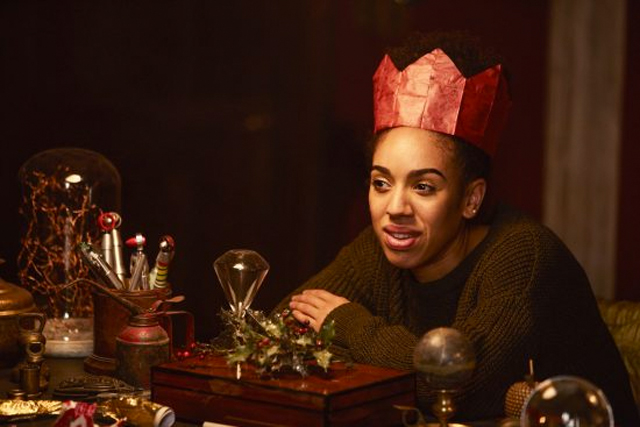
I hope Bill gets to enjoy her time with the Doctor. I hope she gets to be as free in her sexuality as all the companions before her, and to walk away happy when her time on the show is done. I hope that, right now, there are queer kids falling in love with her. I hope they’ll get to spend time with her week after week, and won’t end up with broken hearts. Ten years ago, Doctor Who was the first show to let me see myself, and to feel seen; when I felt entirely alone, it showed me a universe waiting for me. And in ten years time, maybe those kids will be saying the same thing.







